How AbleGamers helped millions of gamers with disabilities
How one West Virginia charity helped start an accessibility revolution
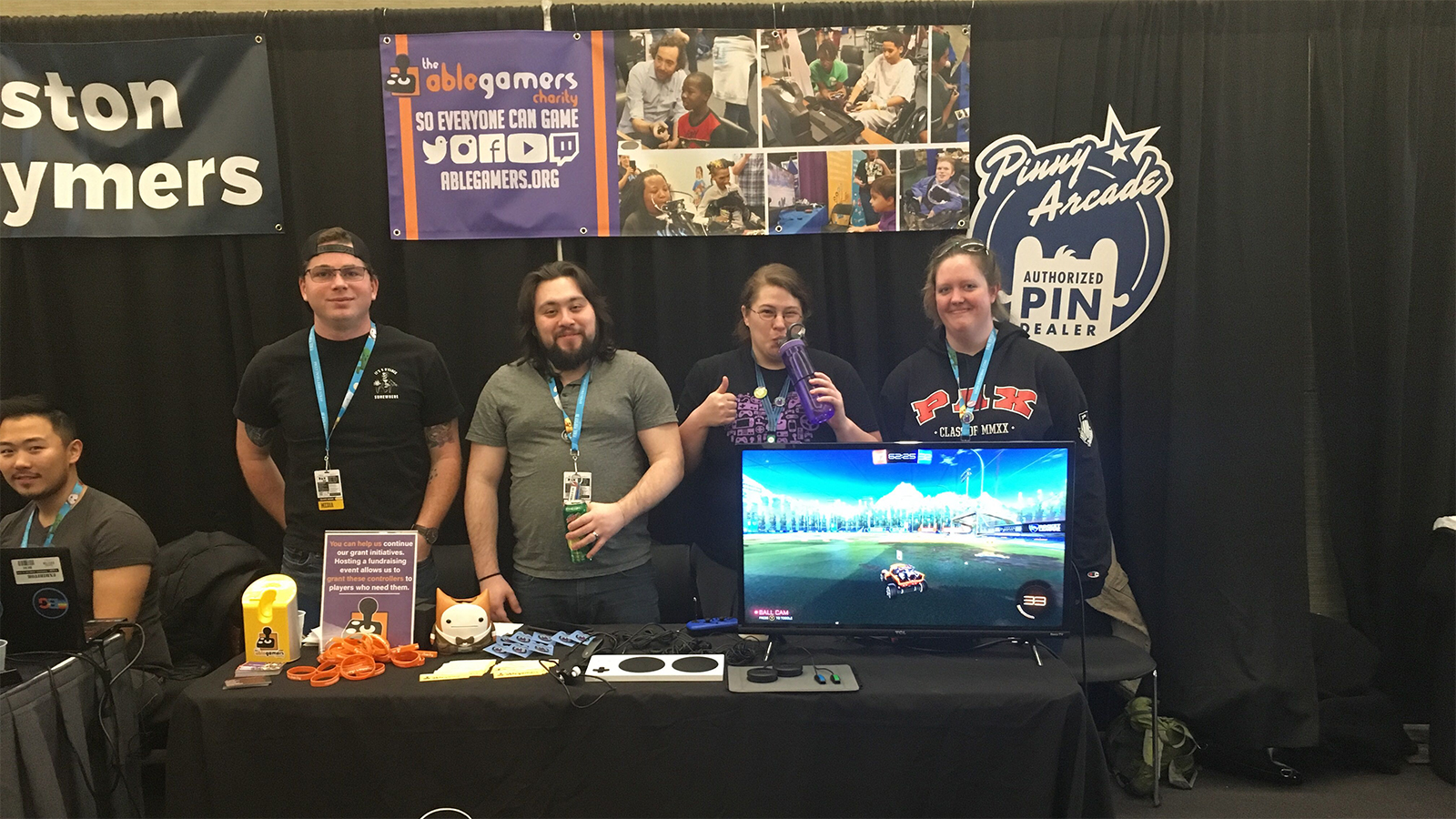
Sign up for breaking news, reviews, opinion, top tech deals, and more.
You are now subscribed
Your newsletter sign-up was successful
According to some estimates, there are as many as 2.6 billion people in the world who play some kind of video game, whether it's on a console like the Xbox Series X or PlayStation 5, on a PC, or on their phones or tablet devices.
It has grown to become a $60 billion industry in the US alone, overtaking the global movie box office, and it is only expected to soar from there. Still, one community has found itself locked out almost entirely to one degree or another since the first video games started showing up on PCs and in video arcades around the world: people with disabilities.
Mark Barlet, the founder of the AbleGamers charity, experienced this up close back in 2004. He and his partner would play EverQuest on the weekends with his childhood best friend, but on one particular Friday, she failed to log in.
Concerned, Barlet called her to find out what had happened, only to find her distraught and in tears.
"MS decided that night that her mousing hand wasn't going to work anymore," he told us earlier this summer, "so we weren't going to play. She loved video games and we loved staying connected playing video games."
"I was literally watching in real time, video games being taken away from my best friend."
Barlet did what anyone in that position would do for someone they loved. He tried to see what he could do to help.
Sign up for breaking news, reviews, opinion, top tech deals, and more.
"I spent that evening on the web looking for solutions for her. I’m an engineer. I thought this was going to be fine. But there was nothing. No one was even having that conversation publicly."
"So we took it upon ourselves."
That was the start of the AbleGamers Charity, a 501(c)(3) non-profit charity that seeks to help people with disabilities play the games that they love.
With the rise of the internet, video games have become a way to connect people from across the world, something that is especially important for people with varying degrees of disability, who often find themselves socially isolated.
"Our mission is to enable play in order to combat social isolation," Barlet said. In the process, Barlet, AbleGamers, intrepid game developers, and the entire worldwide community of gamers with disabilities have touched off a revolution not just in the way games are played, but in the very way the games themselves are made.
- Xbox deals: latest offers on consoles, games and accessories
- PS5 Vs Xbox Series X: which next-gen console should you buy?
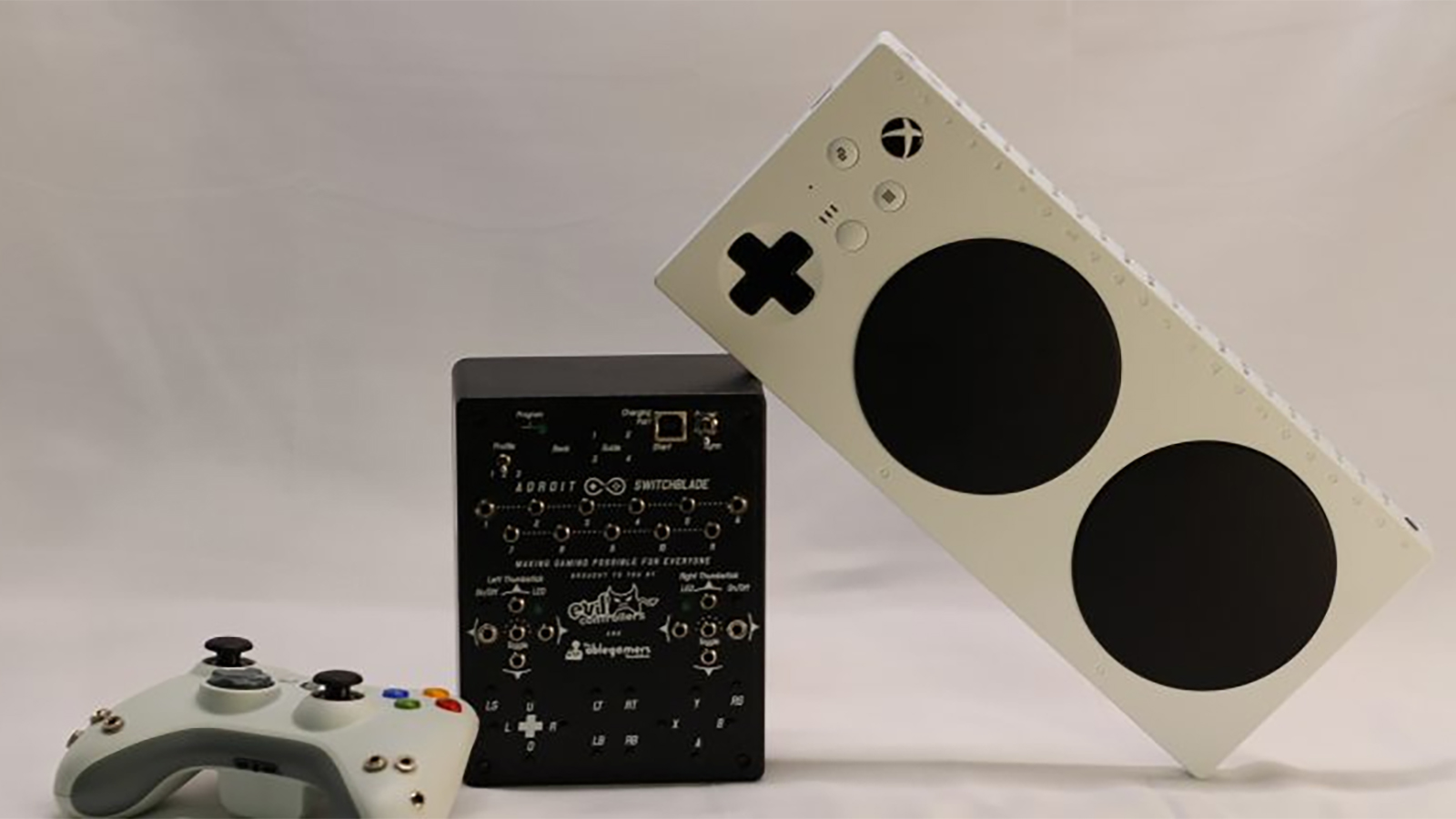
The Adroit Switchblade: the foundation for the Xbox Adaptive Controller
"The number we worked out, in the United States alone, is 46 million." That's how many gamers with disabilities there are living in the US right now – a massive number of people who have had to overcome enormous hurdles just to play a video game.
For decades now, the PC has been the platform of choice for people with disabilities, for fairly obvious reasons. The diversity of peripherals, and the very nature of the way hardware interfaces with PCs, means any number of hardware solutions can be engineered to enable someone with a disability to play video games.
"It’s much more flexible," Barlet said of the PC, "if we’re working with someone who wants to play but doesn't have a lot of resources, we recommend going the PC route because USB is open source so there's so many different ways to put input into a PC."
But PCs themselves can be expensive, especially if you want a system that runs AAA titles the way the developers meant for them to be played. For this reason, console gaming has exploded in popularity, with many excellent titles being exclusive to those platforms, effectively locking out a huge potential audience of people with disabilities.
This was what inspired AbleGamers to develop the Adroit Switchblade.
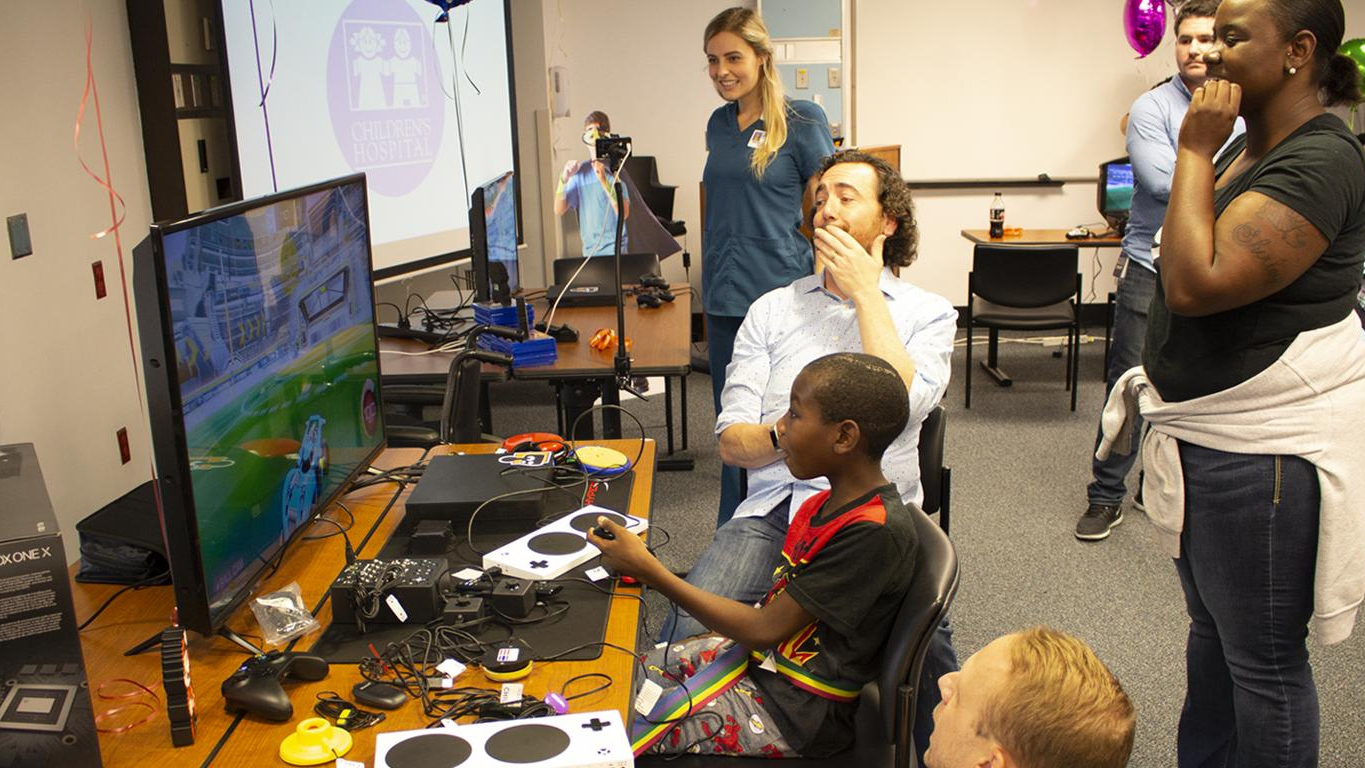
"Ten years ago, we created this idea of a controller built around switches, because the disability community runs on switches. Our friends over at Evil Controllers worked with us to make the Adroit Switchblade for the Xbox 360."
The Adroit Switchblade was a simple box with more than a dozen 3.5mm jack switches that would translate different input onto an Xbox 360 controller board.
"The largest problem with working with consoles is getting past the encrypted controller, so sitting at the bottom of the Adroit Switchblade is actually an Xbox 360 controller board because we needed the chip on it that authenticated it so it could talk to the Xbox."
This was a clever engineering work-around that overcame one of the biggest hurdles for accessibility in console gaming – and Microsoft took notice.
"Microsoft saw this and got in touch with us and said 'Hey, we want to take the Adroit Switchblade and make a first-party product out of it, will you help us?'" Barlet said.
The result of that collaboration was the Xbox Adaptive Controller, released in 2018. "We worked with them for about two years or so," Barlet said, "before the XAC came out because we were the experts, we had already done it."
The Xbox Adaptive Controller is itself a groundbreaking product, not just that it's the first product of its kind from someone as large as Microsoft, but that it signaled a sea change in the industry in how it approached accessibility – something AbleGamers has diligently worked to bring about for the past decade and a half.
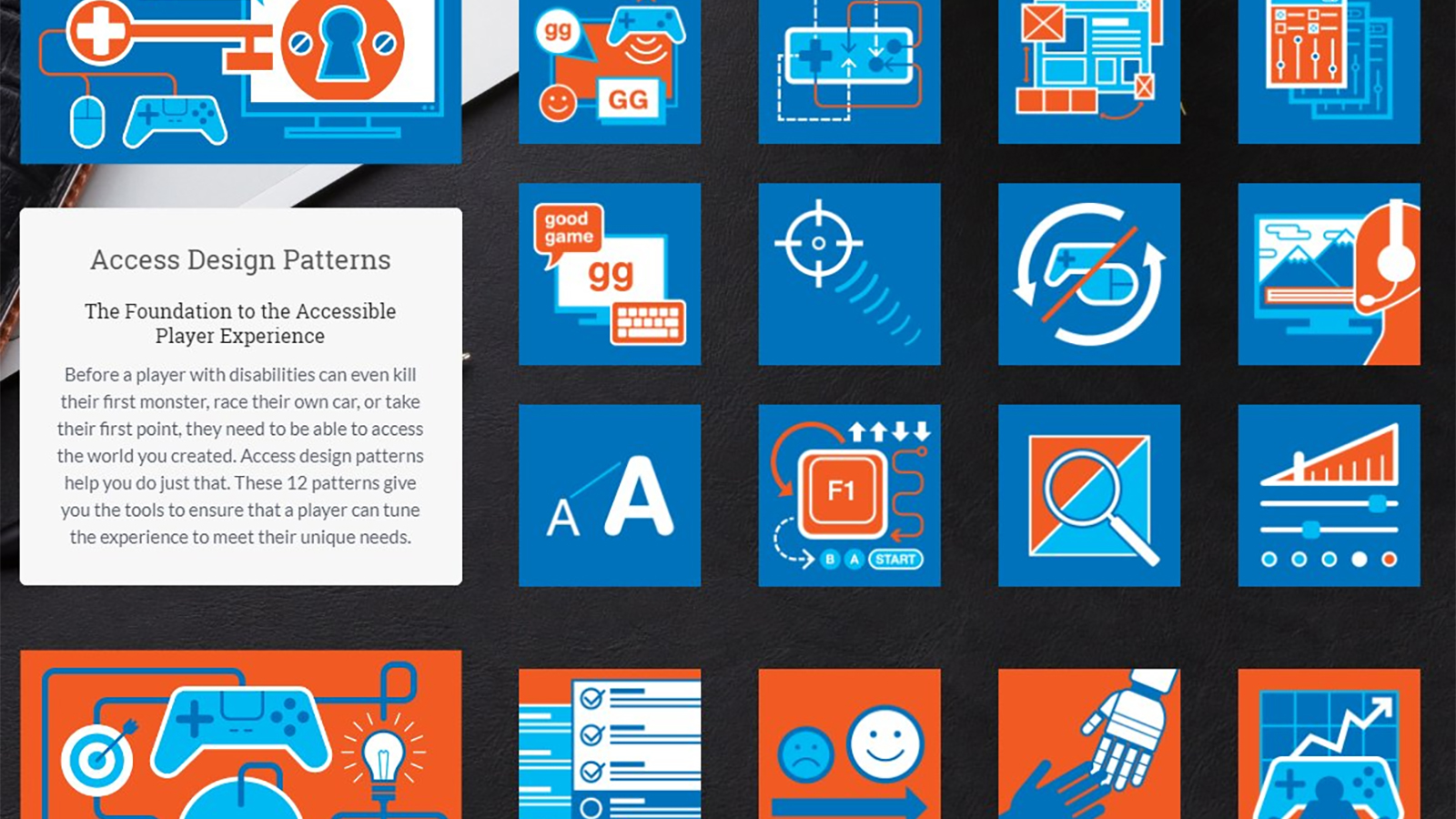
The hardest accessibility challenge of all? Software
When we asked Barlet what the greatest impediment to accessibility was, we hadn't even finished the question before he burst out with "Software."
"I can’t add closed captioning to a game," Barlet said, "therefore I can’t help a deaf gamer. There’s nothing I can build in my shop that will add closed captioning to a game. The hardware hurdles are largely taken care of, so it’s a software problem."
"The reality is we have always been able to bridge the hardware gap. Where we end up hitting a roadblock is when software isn’t designed correctly."
This was the foundation of the Accessible Player Experience project, a series of design patterns for game developers to master that they could then implement to build their games with accessibility at their core, rather than an afterthought.
"We created these 26 design patterns that help developers think about accessibility and it was adopted big time," Barlet said. "We put out a deck of cards that goes with it so you can use this in your system. Microsoft bought 400 decks of cards. PlayStation bought 150 decks of cards."
To those unfamiliar with the concept of a design pattern, the term refers to software development archetypes that are easily understood and implemented by developers with an understanding of how the different design patterns behave and interact with each other.
They are the foundation of all professional software development, not just video games, so creating design patterns around accessibility is truly revolutionary.
"It gives teams a design language and a frame of mind," Barlet explained. "Once you learn the language you can have in depth conversations around accessibility in single sentences: 'Hey, I saw what you did there and we have a second-channel problem.'"
AbleGamers takes it even further by certifying game developers in Accessible Player Experience, or APX.
"We have trained [developers at] Square Enix Montreal, Blizzard Activision, Volition, Avalanche, Microsoft, and we’ve created certified APX experts. People who have gone through our training, taken our test, and proven they understand APX at an expert level – we released them back into the industry."
That inside expertise is essential to pushing accessibility forward, and in many ways has helped create the groundswell of support inside the studios themselves for making games more accessible.
"The other factor is we’re seeing this new generation of developers who knew AbleGamers in high school and college because we'd helped their friends. What ended up happening was you had AbleGamers advocating from the outside and you had allies embedded in the studios that were advocating on the inside as well."
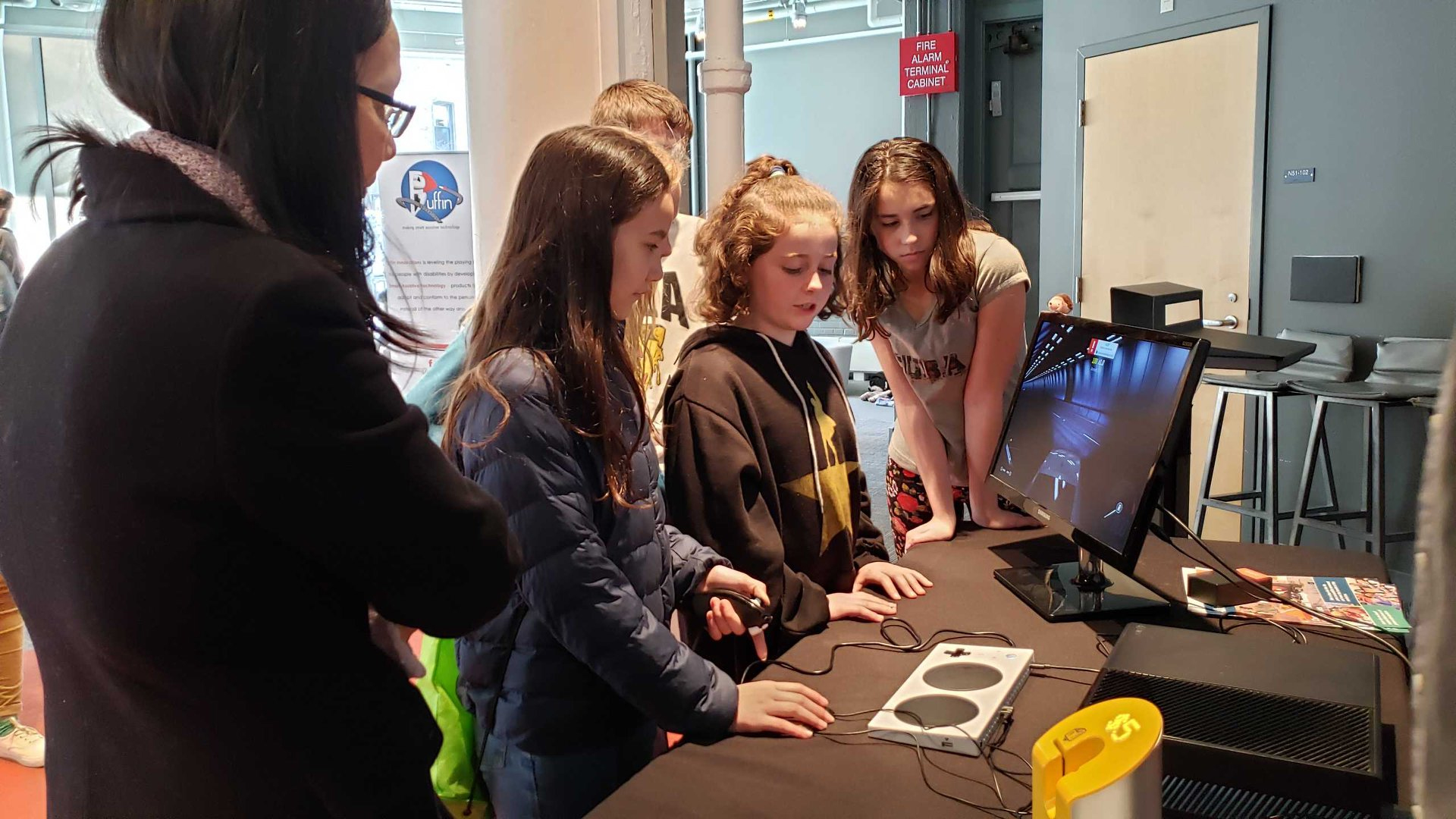
How advocacy, expertise, social media, and the bottom line came together to fuel an accessibility revolution
It's one thing to have AbleGamers advocating for accessibility in gaming from the outside – and even for game devs to be pushing for it within the studios themselves. Video game studios are businesses, so they will go to where the money can be made.
Thanks to social media, a previously ignored, underserved market of millions of gamers with disabilities were finally able to tell their own stories and help show that there was a huge, underserved market out there.
"The rise of social media and how players in the disabilities community were able to share their story only amplified the messages that we had been pushing for 12 years at that point," Barlet said.
Another huge driver of this wave was the rise of indie developers.
"It wasn’t until the rise of the Indie developer and looking at, I think, the tablet and the android market where there were so many things competing for our eyeball space that little indie developers were creating these accessible experiences as a market differentiator in a crowded world."
As important as the moral component of AbleGamers' work is, morality rarely moves industries to change: money does. This is something that Barlet understood and focused on right from the start.
"If you look at the buying power of the population of people with disabilities, I would always talk to a game company and I always say this. I could tell you a sad story and get you to do one thing, one time, as a developer."
"But you haven’t made any systemic change for players with disabilities. But if I tell you that people with disabilities have billions of dollars in discretionary income and that they want to play that game and they’re going to gravitate toward those goods and services?"
"Because we were always telling a marketing story – and not the sad, what I always call the ASPCA, Sarah Mclachlan, sad-puppy commercials – a lot of the game companies came to us and said 'This is now important, help us out.'"
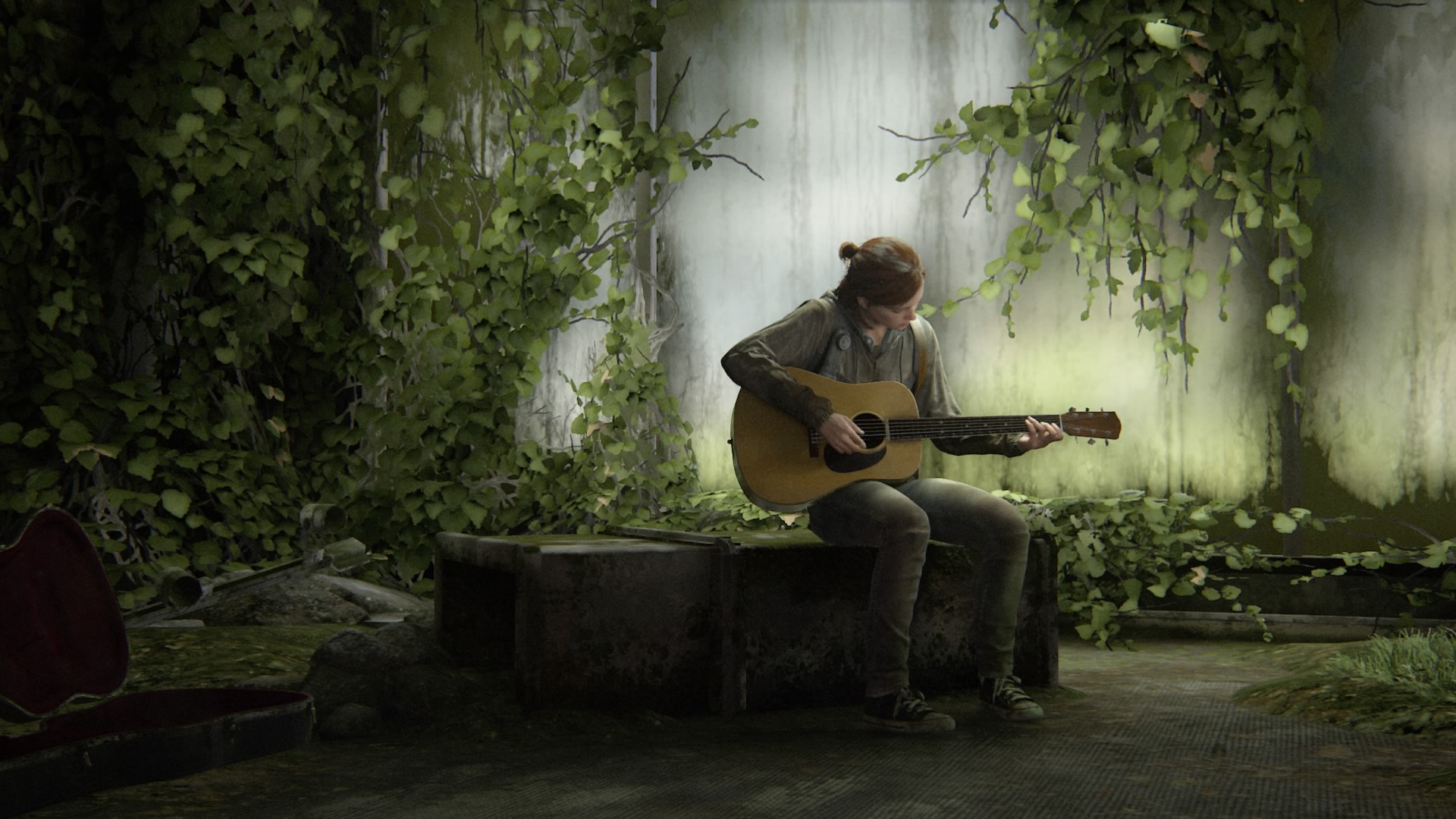
Moving the accessibility revolution forward
Recently, AAA titles have done considerably better at integrating accessibility into their games, often from the ground up.
"We’re getting feedback from developers saying 'We’re storyboarding and we’re starting to make design changes because we understand APX and APX really makes things so much easier to parse out in our heads before a single line of code is written,'" Barlet said.
"Now, accessibility is cheap, accessibility becomes dirt cheap."
Titles like The Last Of Us Part II from Naughty Dog have recently been praised for accessibility features, something we noted in our review of the game. Barlet wasn't surprised in the least.
"I know those guys, Naughty Dog makes accessible games. But they had people on the inside, they had people that were empowered by the work that we were doing on the outside to make these changes on the inside."
In #TLOU2, @gregjhazy and @kelsojoeyo spotted progress options that allow players to customize the combat experience as a means to progress through the game. Here's a highlight of some of these options in The Last of Us Part 2. pic.twitter.com/d5sKSnIHAQJune 26, 2020
"We had reporters coming up to us asking 'Are you surprised?' I was like, 'No, we expected this.'”
The amount of progress AbleGamers has been able to make over the years is remarkable, especially given it's size.
"Sometimes I’m overwhelmed thinking about what we’ve done," Barlet said. "To put it into perspective, we’re only six people!"
As a 501(c)(3) organization, AbleGamers relies entirely on donations to fund its work, much of which includes giving grants to gamers with disabilities to fund the purchase of the equipment they need to play the games they want to play.
As remarkable as the Xbox Adaptive Controller is, it is only one component in creating an accessible interface for a broad spectrum of different physical disabilities, although it is an essential one.
"We were excited that the Xbox Adaptive Controller was first-party," Barlet said. "It is much more affordable than anything we could ever make. Our poor device came in at about $400 because it was lovingly handcrafted in Arizona."
The real cost starts to mount when you have to purchase the switches to actually integrate the Xbox Adaptive Controller into a hardware solution that is tailored to address a persons unique disability.
"Each one of those switches is anywhere from $20 to $120," Barlet explained. "On average, say each one of these holes needs to be filled with something that’s $20, you’re looking at $500 in switches. So there’s still that concern and one of the things AbleGamers does is we do grants to help players with disabilities who can’t afford this, but I guarantee you that the Xbox Adaptive Controller is the cheapest thing in the box."
I am so shook.@Twitch donating $1,000,000 to @AbleGamers is going to *literally* change the lives of thousands of people with disabilities.To you who supported me, my work, AbleGamers, and our lofty dream of enabling everyone to play: Thank youThey did this because of you! pic.twitter.com/pxtYXs5lQXNovember 14, 2020
Still, with 46 million gamers with disabilities in the US alone, there is an enormous amount of need for the kind of work that AbleGamers does, which is itself a challenge for any charity, much less one working in the tech space.
"We’re only about 35% to 40% funded," Barlet said this summer. "The demand far outstrips our resources. We have far more people who need our help than we’re able to help."
Still, progress is being made. After the success of the Xbox Adaptive Controller, we asked if other industry giants were expressing interest in replicating Microsoft's success. Barlet couldn't name names, but he said, "I can only answer the question by saying yes."
This week, Twitch announced they were donating $1 million to AbleGamers, which is one more step toward making gaming accessible to everyone who wants to play them. Hopefully, more companies will follow suit and the growth in popularity of charity streams on platforms like Twitch certainly helps.
In the end, thanks to the work of AbleGamers and others, people with disabilities are being empowered to play the games so many of us take for granted - and we are really only at the start of the accessibility revolution. For a small team of six people, it's an extraordinary achievement, one for which we should all be grateful.

John (He/Him) is the Components Editor here at TechRadar and he is also a programmer, gamer, activist, and Brooklyn College alum currently living in Brooklyn, NY.
Named by the CTA as a CES 2020 Media Trailblazer for his science and technology reporting, John specializes in all areas of computer science, including industry news, hardware reviews, PC gaming, as well as general science writing and the social impact of the tech industry.
You can find him online on Bluesky @johnloeffler.bsky.social
